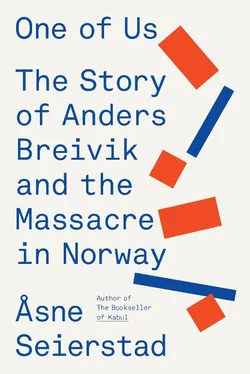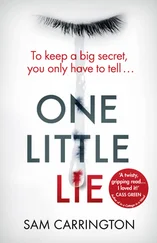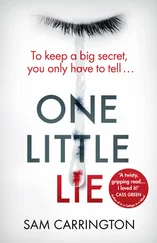His only slight problem was a lack of stamps. He therefore urged all those writing to him to enclose stamps for return postage. His daily allowance of forty-one kroner did not go very far when stamps cost ten apiece.
One of his correspondents was someone calling himself Angus. That username put everything he received on the website The Breivik Archive .
In July 2012, a few weeks after the end of the trial, Breivik wrote to him: ‘I shall sleep for a year now!’ He wrote that he was very keen to establish contact with sympathisers on the internet, via blogs and on Facebook. He would be happy to write essays about the battle against cultural Marxism, multiculturalism and Islamisation.
‘I sacrificed and forfeited my old family and friends on 22/7, so my correspondents will be the closest thing I have to a family. Don’t be freaked out by that, because I can assure you I am corresponding with many brothers and sisters all round the world :-) I am now living in isolation and will very likely do so for many, many years. This is not problematic, as it was clearly my own choice. I am used to living ascetically, so it will not be difficult to carry on in the same way :-) In fact, it has given me a focused and balanced mind, not polluted by greed, desires and appetites – and one can work. If I tell myself this often enough, I’m bound to believe it in the end, haha!’
Prison inmate Anders Behring Breivik could, in short, communicate with anyone he wished. He could write anything apart from texts that could be seen as a direct incitement to criminal acts.
After the trial, Ila prison requested new guidelines about how to handle his correspondence. The answer came back that the existing rules were to be interpreted and applied more strictly. In the light of the act of terrorism committed by the prisoner, and what he had said at the trial about it still not being complete, all political statements to sympathisers were to be viewed as incitements to violence.
The tightened-up regime came into force in August 2012. Once the deadline for appealing the custody verdict passed in September, the PC was taken away from him. The detainee was no longer the responsibility of the police, but of the Directorate of Correctional Service. Only in special circumstances, and solely for educational purposes, were prisoners allowed to borrow a computer. The prison would not make an exception for Breivik.
This was a big loss to him. Without the PC he could no longer cut, paste and copy the letters he wrote. They had to be written one by one. In addition, they were now often stopped by the censor. His quality of life plummeted.
The conditions were degrading and unbearable, he wrote in his letter of complaint.
He was short of cash and wanted cigarettes, snus and his favourite sweets, liquorice logs. If he cleaned his three cells himself his daily allowance went up to fifty-nine kroner. He had done little cleaning in his life. At Hoffsveien his mother took care of it, and before that, when he lived on his own, his mother had come round to clean for him as well. At Vålstua farm, the grime had simply accumulated.
At Skien prison, where he had been held for a while, he had access to a mop. At Ila he was issued with a cloth.
‘In other words, I am forced to scrub the three cells on my knees, which I find demeaning.’
* * *
While her son was serving his sentence at Ila, Wenche Behring Breivik went back and forth between Hoffsveien and the Radium Hospital. Some months after the terror attack, a tumour had started to grow inside her. It grew rapidly. She underwent an operation, and was given chemotherapy and drugs for the pain and the nausea.
As winter was coming to an end, she got a room on the second floor of the Radium Hospital. The cancer had spread to her vital organs.
On the glass door to the corridor where Wenche Behring Breivik’s room was located, a sign informed visitors that no flowers or plants, fresh or dried, were to be taken on to the ward. External bacteria were to be kept out.
The walls of the corridors were greyish white. The doors were green, with black numbers stuck on them. A little sign hung on one of them, on a metal chain: Visitors are asked to report to the staff.
This was the room of the terrorist’s mother.
The door to the room was wide. A bed could easily be wheeled in and out. But the room itself was narrow, with space beside the bed only for an armchair and a small table. The view had the same shade of grey every day, because the room was in a corner of the building where grey walls protruded. The room looked out over a roof a floor below, covered in grey shingle. If you rested your head on the pillow, you could see a little section of sky.
‘I’m the unhappiest mother in Norway,’ Wenche had told the police just after her son’s arrest. ‘My heart is all frozen up.’
Over the winter, her heart had thawed a little. She could not bring herself to think about the terrible thing that had happened. Nor to speak of it, nor to have it in her head. She wanted to remember what was good, what had been good.
One day in early March she decided to tell her story.
The ground outside the hospital was still white and hard as ice, trampled down after a winter in which new snow kept on falling. There hadn’t been so much snow in the city for years, nor such treacherous pavements, nor such great skiing on the slopes above the hospital.
Wenche sat upright in bed in a pale blue hospital gown, her head held high. Her scalp was bare, with just a few downy bits of hair waving on top. Her blue eyes were fringed by eyelashes with black mascara, and there was a shimmer of grey-blue shadow on her eyelids. Her face was gaunt; her skin, with liver spots and patches of solar keratosis, was stretched thinly over sharp cheekbones. Her gaze was open and direct.
‘I was so proud of…’ she began.
Her voice broke. She tried to pull herself together. ‘I might start crying every so often, but it can’t be helped…’
She went on from where her tears had interrupted her: ‘… proud of being the mother of… of Anders and Elisabeth…’
Her sobbing got the better of her, her shoulders shook. She struggled to be able to speak again. ‘I, I… I did the best I could…’
She let her emotions have the upper hand for a few moments before getting a grip on herself and saying clearly:
‘Oh, we thought we’d found happiness!’
There was a metallic note to her voice, something mechanical, something a little old-fashioned.
‘Then it was Silkestrå. We bought a flat in 1982, moved in and started our homely happiness project. Which is the best thing that ever happened to me. Oh, I thought it was so nice. The children thought it was nice. We were looking forward to starting our new life. There’d be no more obstacles in our path. We could get busy on everything, things that needed doing, like decorating the flat, and I had my job as well, so they were grand times…’
Her phone played a little tune. She answered it.
‘Yes, oh hello, Elisabeth. Yes, fine. Yes, really sick, I throw up every day. Much the same, pretty bad, yes. No, they haven’t moved me yet, we shall have to see. Yes, they explain everything, but I lose the thread. You know, cancer patients have a tendency to be suspicious of what they’re told. I don’t really feel very good wherever I am, and I shall be going home soon now. All right, bye for now, Elisabeth.’
She went on with her story.
‘Things weren’t going well for Anders at the time. Dreadful. Lots of break-ups in his life. Of course he got overlooked in the midst of it all. When you’re caught up in a conflict, you’re blind to your children and other people. You don’t see yourself clearly either. You can’t.’ She paused. ‘And I felt guilty about being inadequate. I’m sure I did.’
Читать дальше












